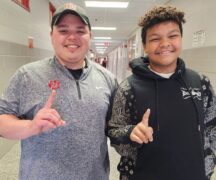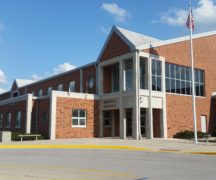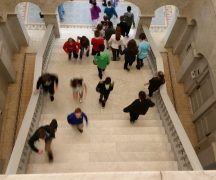By DAVID DUPONT
BG Independent News
If the students in the Bowling Green Middle School Girls Who Code club Googled “inspiration,” Misa Gireau may very well be a top search result.
Gireau’s video chat early this week with the students, though, was arranged in decidedly old-school fashion. Laura Leventhal, a professor emeritus in computer science at Bowling Green State University, has spoken to the club, and she thought they may want to talk with a woman who works for Google.
So she asked her son, Sam Jaffee, who works for the tech giant, for suggestions. So Monday afternoon Gireau beamed into the Middle School classroom to talk about her path to a tech career and her job as a user researcher.
Asking a young person what they want to do when they grow up “is a ridiculous question,” she said.
A career path to a job you love twists and turns and involves false stops and changes of direction, she said. That’s what her path has been like.
Growing up she loved snowboarding and video games, and playing hockey. She dreamed of playing for her beloved Philadelphia Flyers. Or maybe she wanted to be a veterinarian, or scientist, or an astronaut, or Agent Scully from “The X-Files.”
She went to school and studied psychology and computer science. She did coding for the aircraft manufacturer Lockheed-Martin and realized she didn’t like that. Her stint in theoretical mathematics where she “sat in a room all day balancing really, really weird equations that meant nothing to me” also proved not a good fit.
Being someone who wants to help others, she tried counseling. As much as she loved her patients and being a therapist, “the mental health system was broke.”
Instead she concentrated on research and that led her to her current career as a user researcher, first with the U.S. Census, then Capital One, and now with Google. But all those previous occupational forays have taught her something.
A user researcher, she said, studies those interacting with software and devices to see how the experience can be improved. The researchers find the problems and then the software engineers write “this magical code” that solves them. She’s worked recently on a night camera app.
Sometimes she conducts online surveys. Other times she’ll go out into the field to watch people. Other times she’ll have subjects come into her lab to observe them. That includes using a device that tracks their eye movements to see exactly where they’re looking. She demonstrated the technology.
Gireau told the students that another important aspect is to find mentors.
At Google she has a co-worker who helps her navigate the interpersonal interactions in the male-dominated tech field. She said she has encountered instances where she’s been ignored or her ideas have been presented as a male employee’s idea.
In college, she recalled a professor who took her and a fellow student aside because they were his most curious students and were alway asking questions.
The professor had developed a neuroscience lab to study sleep in a janitor’s closet and asked them to meet him there.
While Gireau was describing the scenario, students and teachers started to nervously laugh, and comment quietly.
Clearly this set up red flags among them. Gireau agreed that she had questions at the time, but the professor was not “creepy,” and the work exposed her to a new field of study.
Jodi Anderson, a club advisor, said that the after-school club has more than 20 students involved, more than can be accommodated in the lab, but usually not all can attend so it works out.
Faculty at the school involved in technology volunteer to advise the club.
Students gather for hands-on activities and to watch video presentations. Having someone in person, such as Leventhal’s talk earlier, or live from California is a treat.
Anderson said the eighth graders are asking about what courses they can take in high school.
Two members of the club, Maddie Milks and Whitney Bechstein, took Gireau’s comments about indirect career paths to heart. “Sometimes you don’t have to stick to what people think you should do,” Bechstein said
For now they each have interests. Milks said she’s considering the possibility of being a social studies teacher. Bechstein said she’s looking at digital art and design.
She enjoys the club because it’s a way to explore the possibilities ahead in a setting “filled with girls like me.”
Milks said she’d taken and enjoyed a coding class at the Wood County District Public Library. When she heard about the Girls Who Code club, her response was immediate: “Great, let’s do this!”





